The Ahara Kar website (https://ahara.karnataka.gov.in/ formerly https://ahara.kar.nic.in/) is the official portal of the Karnataka Food and Civil Supplies Department.
It provides services like ration card applications, status checks, card details, and access to the Public Distribution System (PDS).
Ahara Kar e-Services
Here is the list of e-services provided by the Ahara Kar website:
- E-Ration Card
- Show Ration Card
- New Ration Card
- Share
- Ration pickup status
- Show willingness of APL RC
- Cancelled/Hold list
- Village list
- New ration card not issued
- E-Status
- New/Existing ration card status
- Correction request status
- DBT status
- E-Fair Price Shop
- Show FPS
- Remove taluka list
- Remove FPS sharing list
- Show POS store
- Show P.C. list
- Open a wholesale depot
- FPS opinion
- Statistics
- Ration card statistics
- Distribution of fair price shops
- List of fair price shops
- Request for new ration card
- Maximum members of the P.C.
- Store with the highest P.C., etc.
New Ration Card Application
Here’s the process for applying for a new ration card in Karnataka:
- Step 1: Visit the Official Ahara Portal
- Go to the official website: https://ahara.karnataka.gov.in.
- Navigate to the e-Ration Card Services section.
- Step 2: Register/Login
- Register yourself using a valid mobile number.
- An OTP will be sent to your registered mobile number for verification.
- Step 3: Select "New Ration Card Application"
- From the list of available services, choose the option for New Ration Card Application.
- Step 4: Fill in the Application Form
- Provide the following details:
- Applicant’s Information: Name, age, and Aadhaar number of the head of the family.
- Family Members’ Details: Names, relationships, ages, and Aadhaar numbers of all family members.
- Residential Address: Provide the current residential address with proof.
- Income Details (for BPL cards): Mention your household income.
- Provide the following details:
- Step 5: Upload Documents
- Attach scanned copies of the following:
- Aadhaar cards for all family members.
- Proof of address (electricity bill, rental agreement, etc.).
- Income certificate (for BPL cards).
- Passport-size photographs.
- Surrender certificate (if applicable, for applicants transferring from another state/district).
- Attach scanned copies of the following:
- Step 6: Submit the Application
- Review the application details to ensure accuracy.
- Submit the application form.
- Save the Acknowledgment Number for future reference.
- Step 7: Verification Process
- The application will be sent to the concerned officials for verification.
- An officer may visit your residence to verify the provided details.
- In case of any discrepancies, you will be notified to make corrections.
- Step 8: Ration Card Issuance
- Once the verification is complete, the ration card will be approved.
- You will receive a notification on your registered mobile number.
- Download the e-Ration Card from the portal or collect the physical card from the concerned office.
Check the Status of Karnataka Ration Card
To check the status of your application or existing ration card, follow these steps:
- Access Ahara Karnataka portal - https://ahara.kar.gov.in/.
- Navigate to the ‘E-services’ tab.
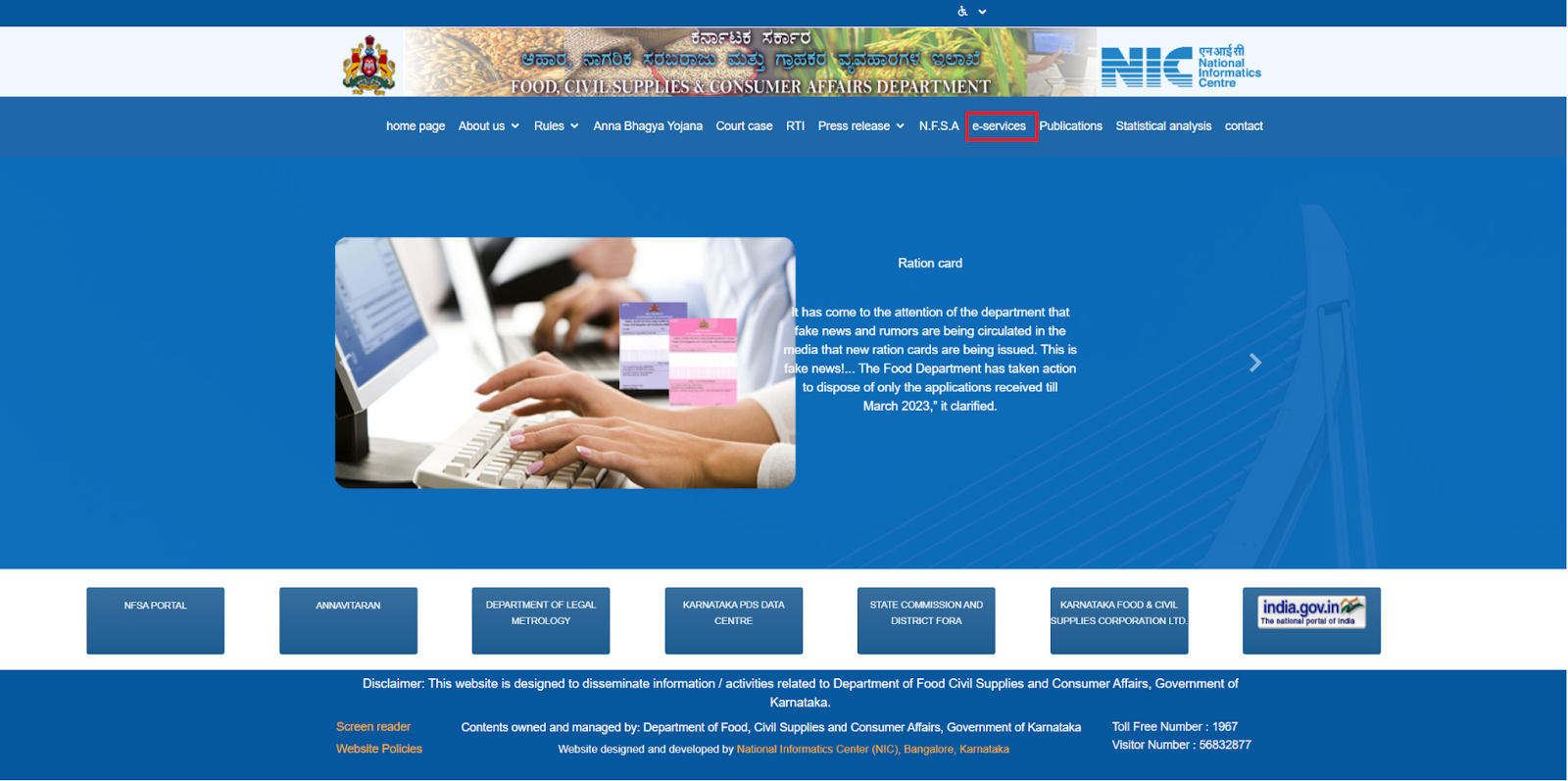
- Click on ‘New/Existing RC Request Status’.
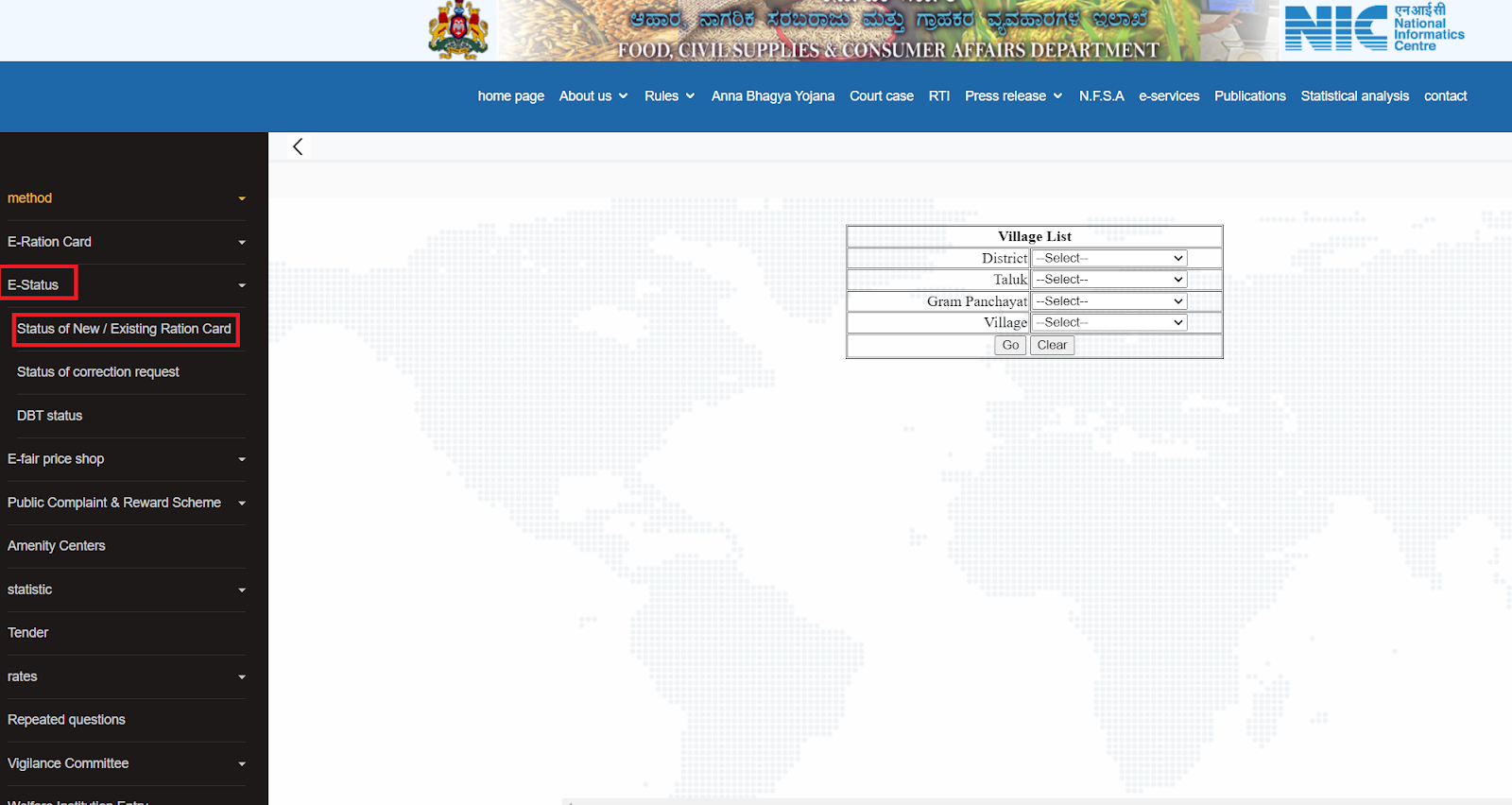
- Select the appropriate division.
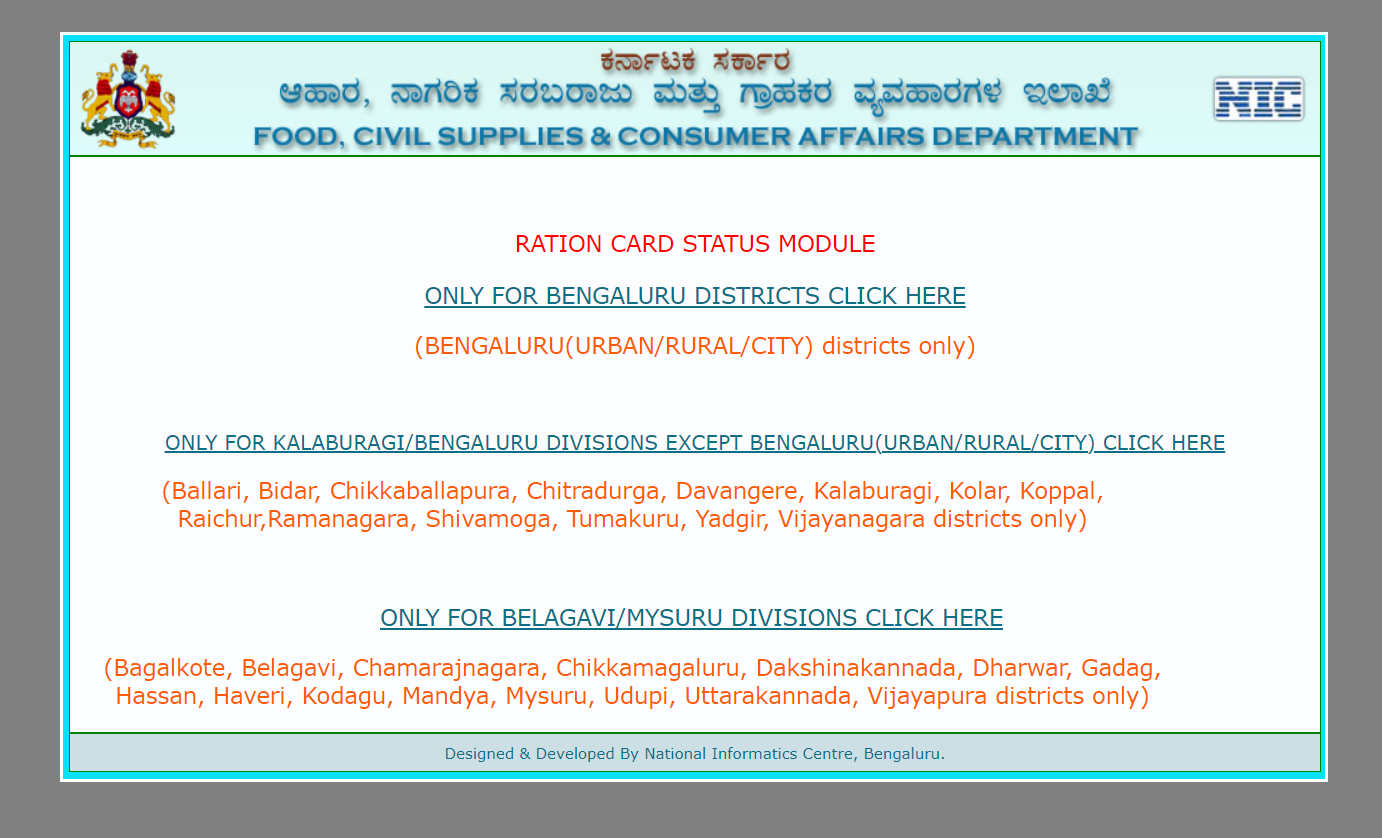
- Input your ration card number and verification type.
- Click ‘Go’ to view the status of your ration card.
Check DBT Status
Here’s how you can check your DBT status:
- Open the Ahara Karnataka portal and head to the e-Services section.
- Within e-Services, select e-Status, and then choose DBT Status from the available options.
- Pick your division from the list (Bangalore, Mysore, or Kalaburagi).
- Now, on the new page, click on Status of DBT link.
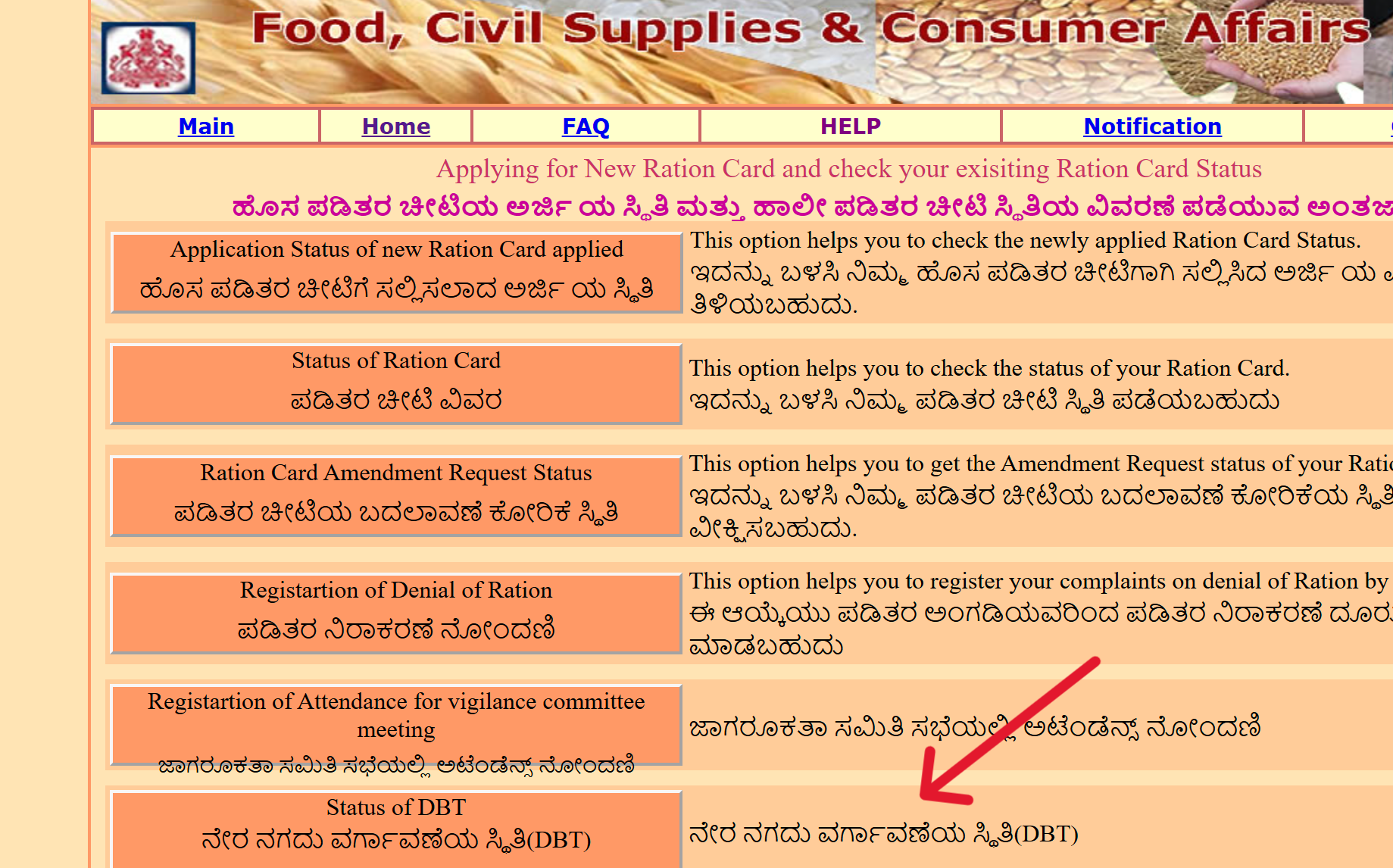
- Fill in the required details, including:
- The year
- The month
- Your RC number
- The CAPTCHA code displayed on the screen
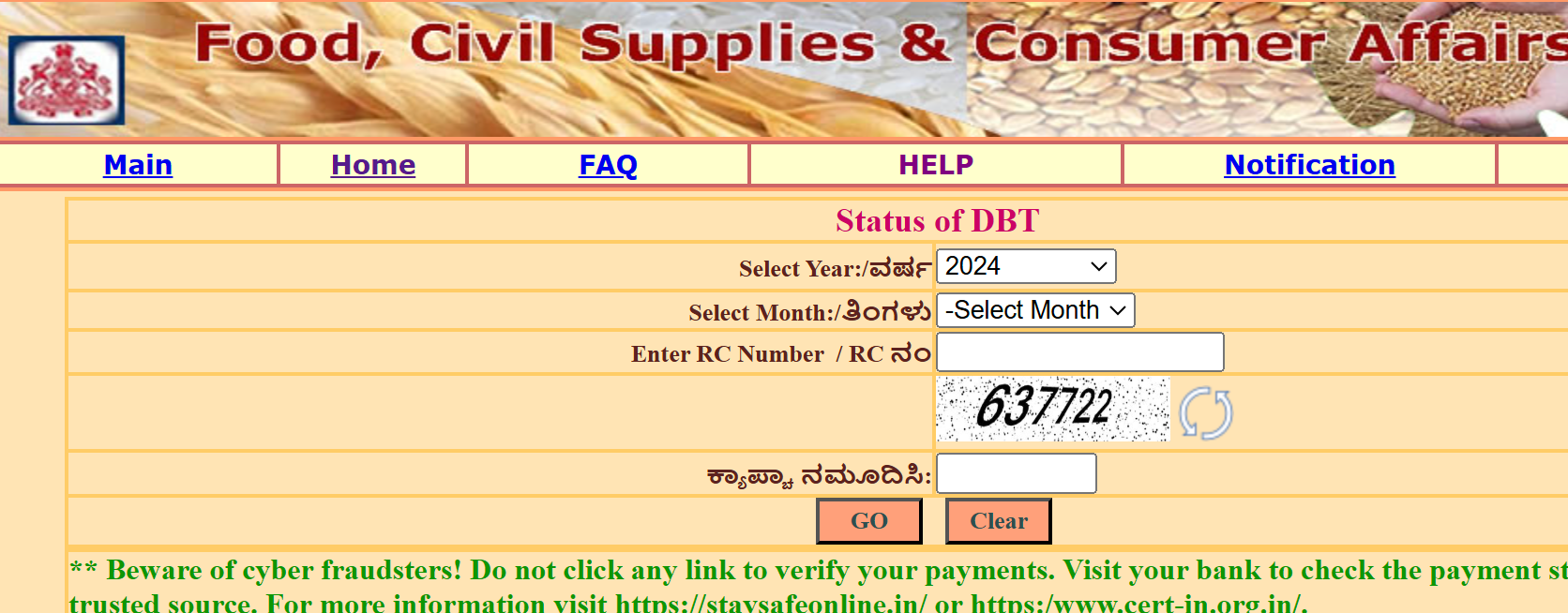
Finally, click the Go button to access your DBT status.
Karnataka Ration Card Download
To download your ration card from the Ahara Portal:
- Go to Ahara Karnataka - https://ahara.kar.gov.in/.
- Click on the ‘E-services’ tab.
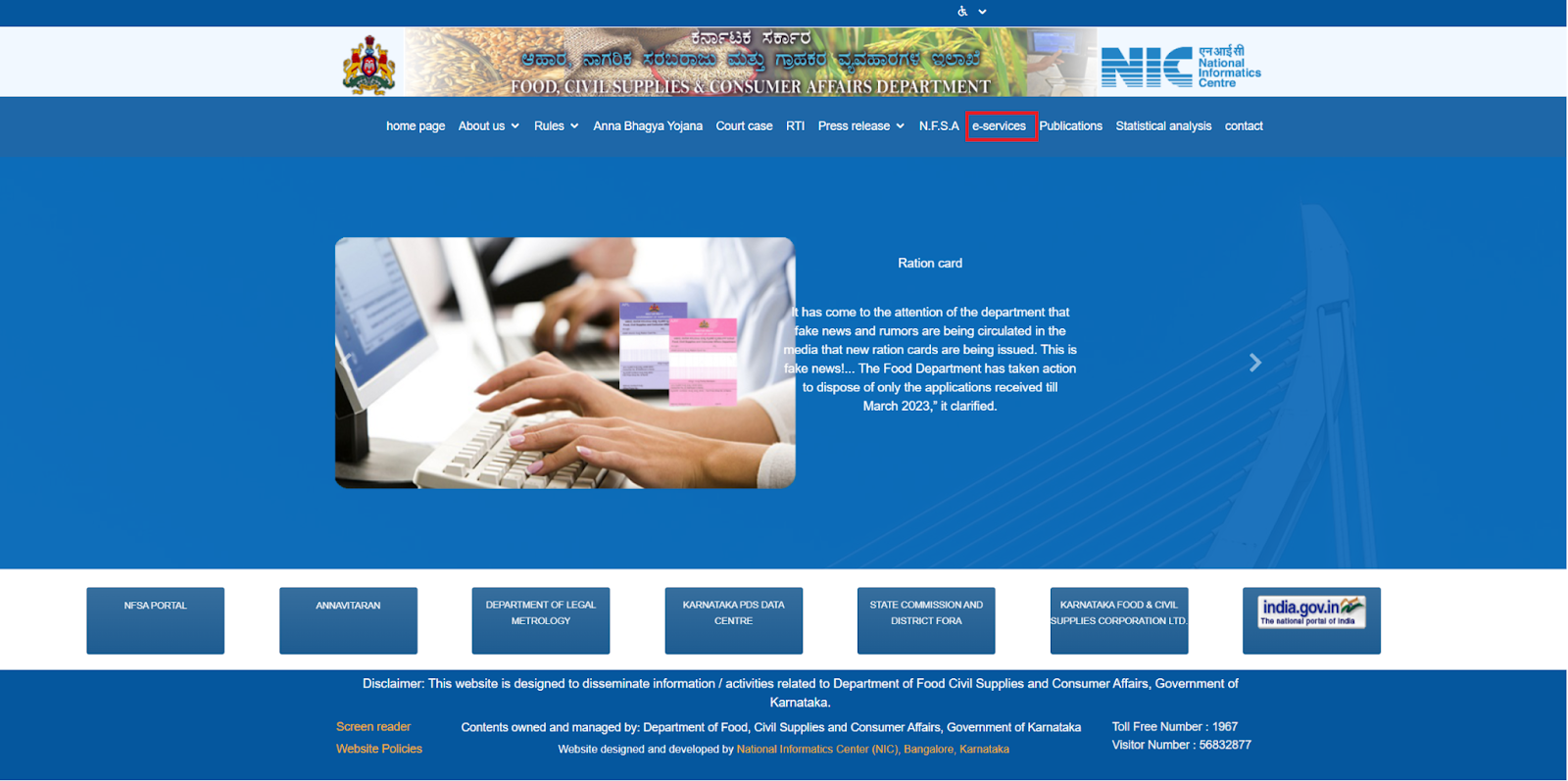
- Choose ‘Status of New / Existing Ration Card’.
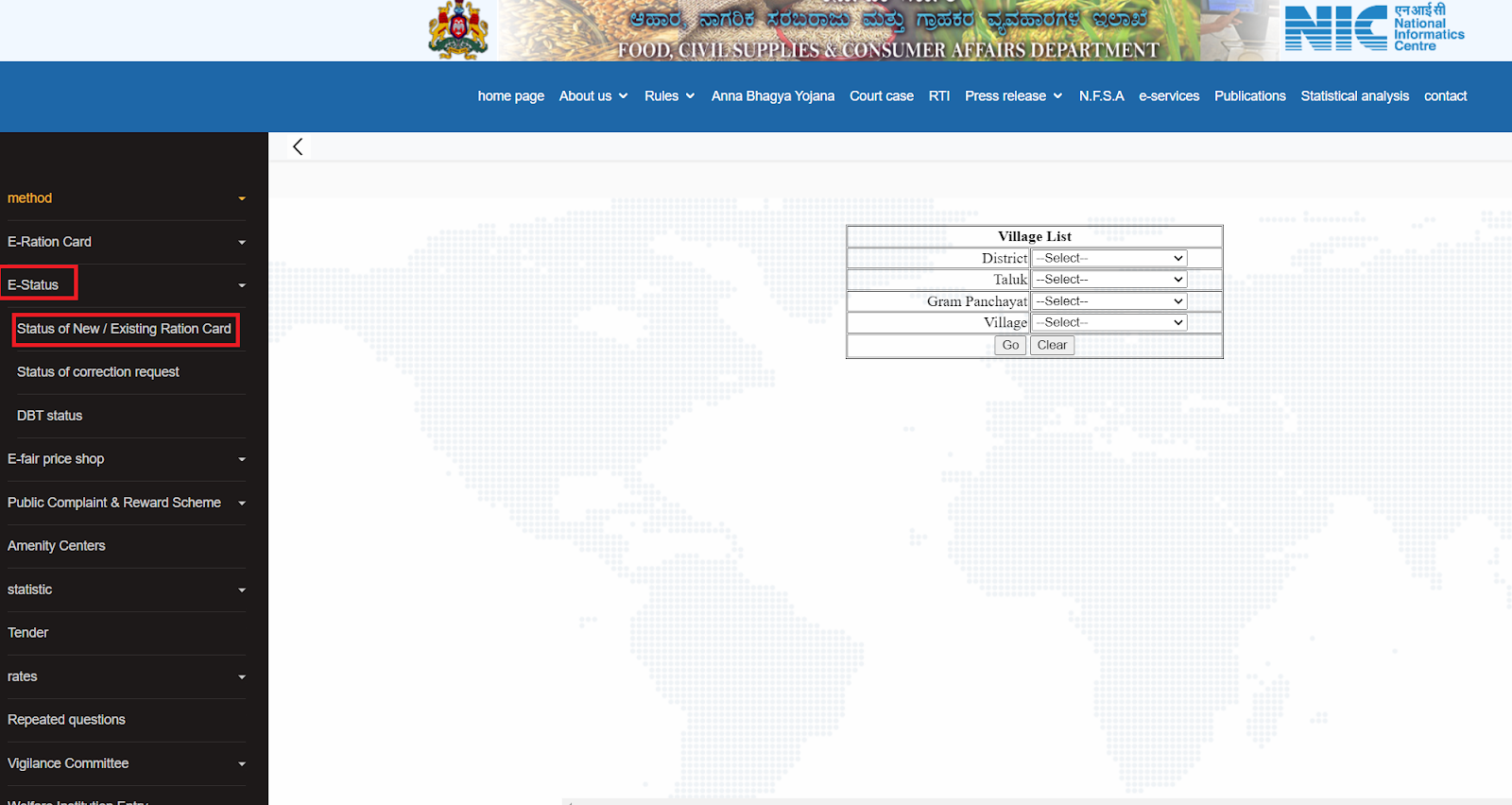
- Provide your ration card number and other required details.
- An OTP will be sent to your registered mobile number. Enter this OTP for verification.
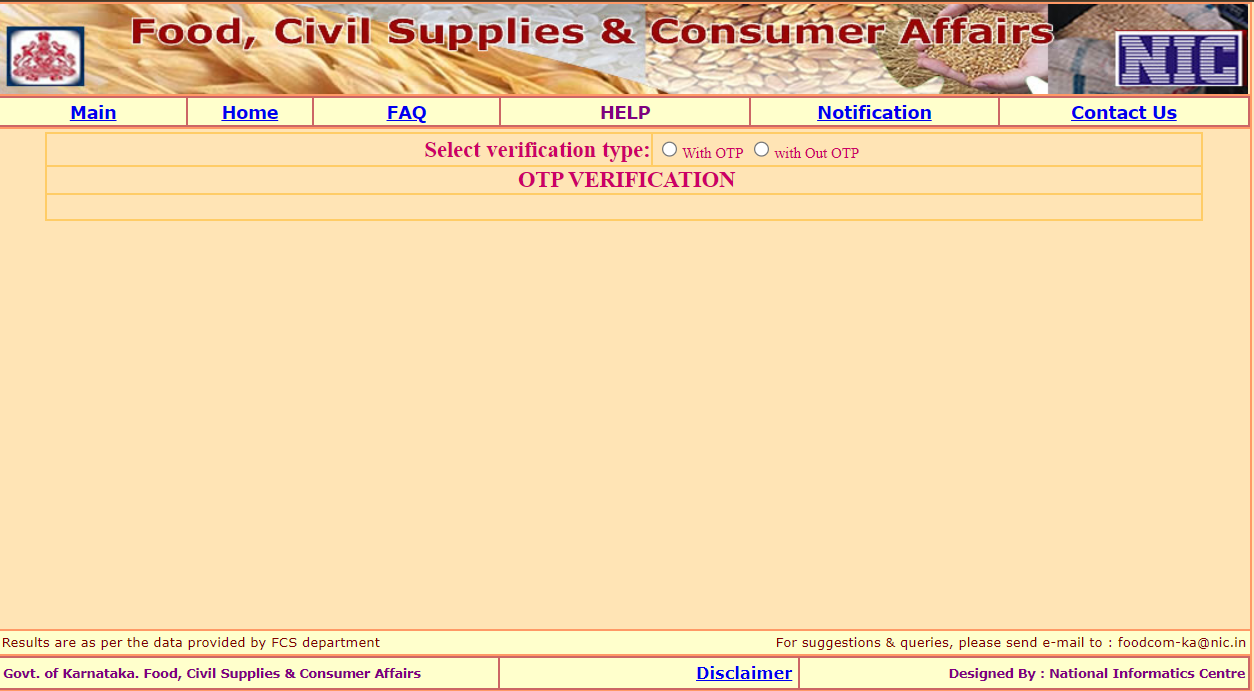
Linking Aadhaar UID to Ration Card
Linking Aadhaar to your ration card is mandatory. Follow these steps:
- Go to the Ahara Karnataka official site.
- Click on ‘e-Services’.
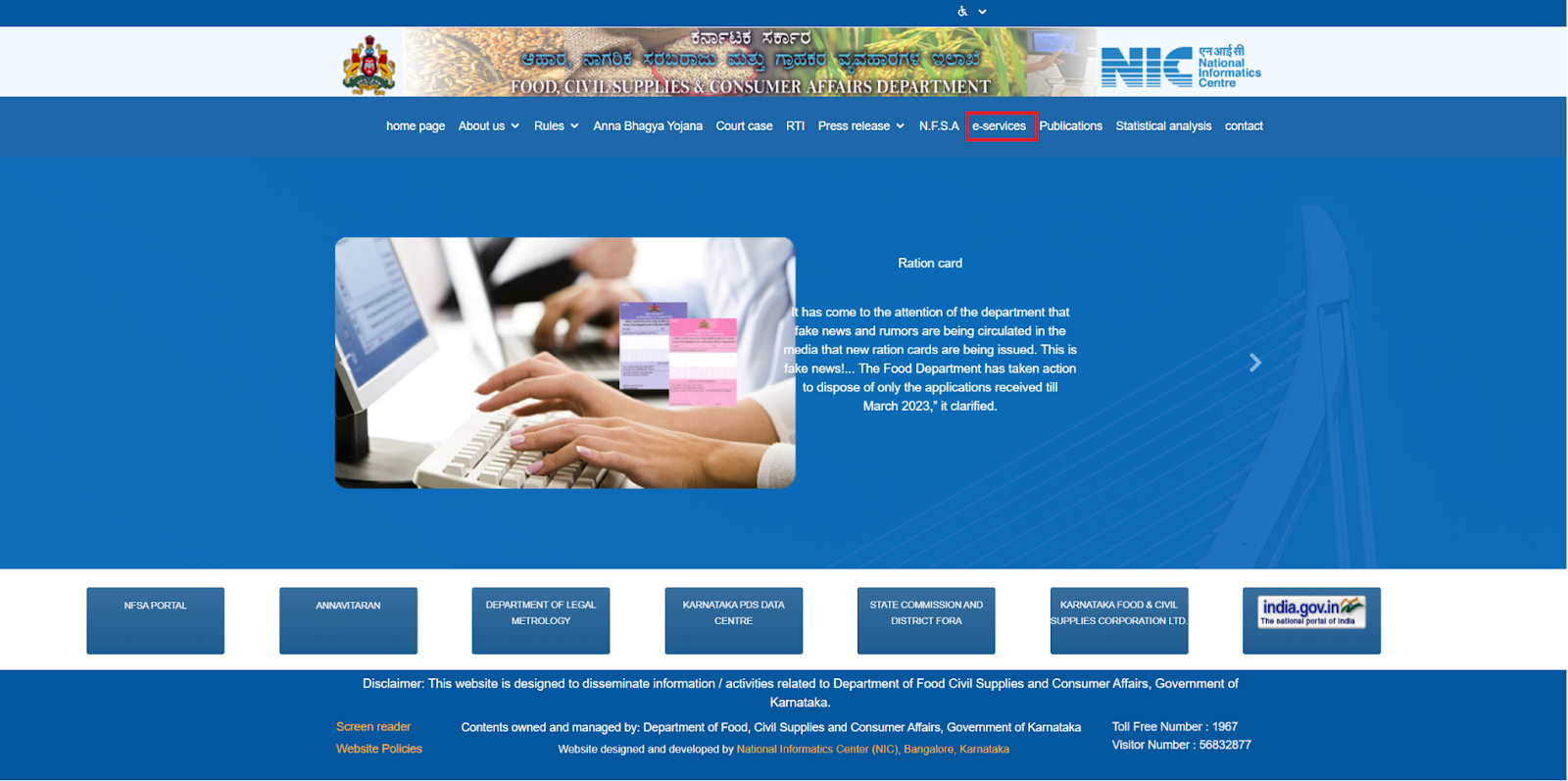
- Select ‘Linking UID’ under ‘e-Ration Card’.
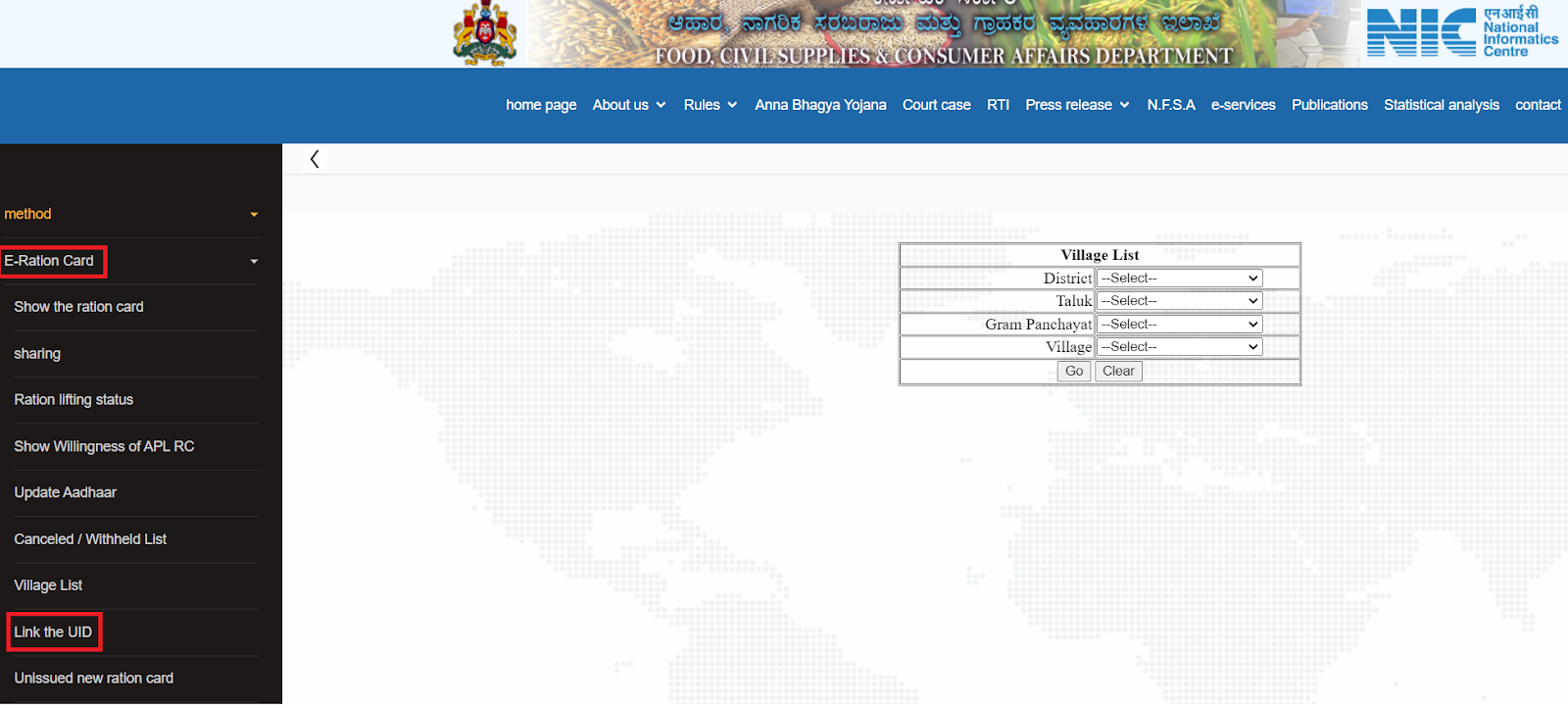
- Provide your Aadhaar number and click ‘Go’.
- Enter the OTP sent to your registered mobile number.
- Enter your ration card number and complete the linking process.
Checking Cancelled or Suspended Ration Cards
To check if your ration card has been canceled or suspended:
- Go to Ahara Karnataka official Website - https://ahara.karnataka.gov.in/.
- Click on ‘e-Services’.
- Select this option under ‘e-Ration Card’.
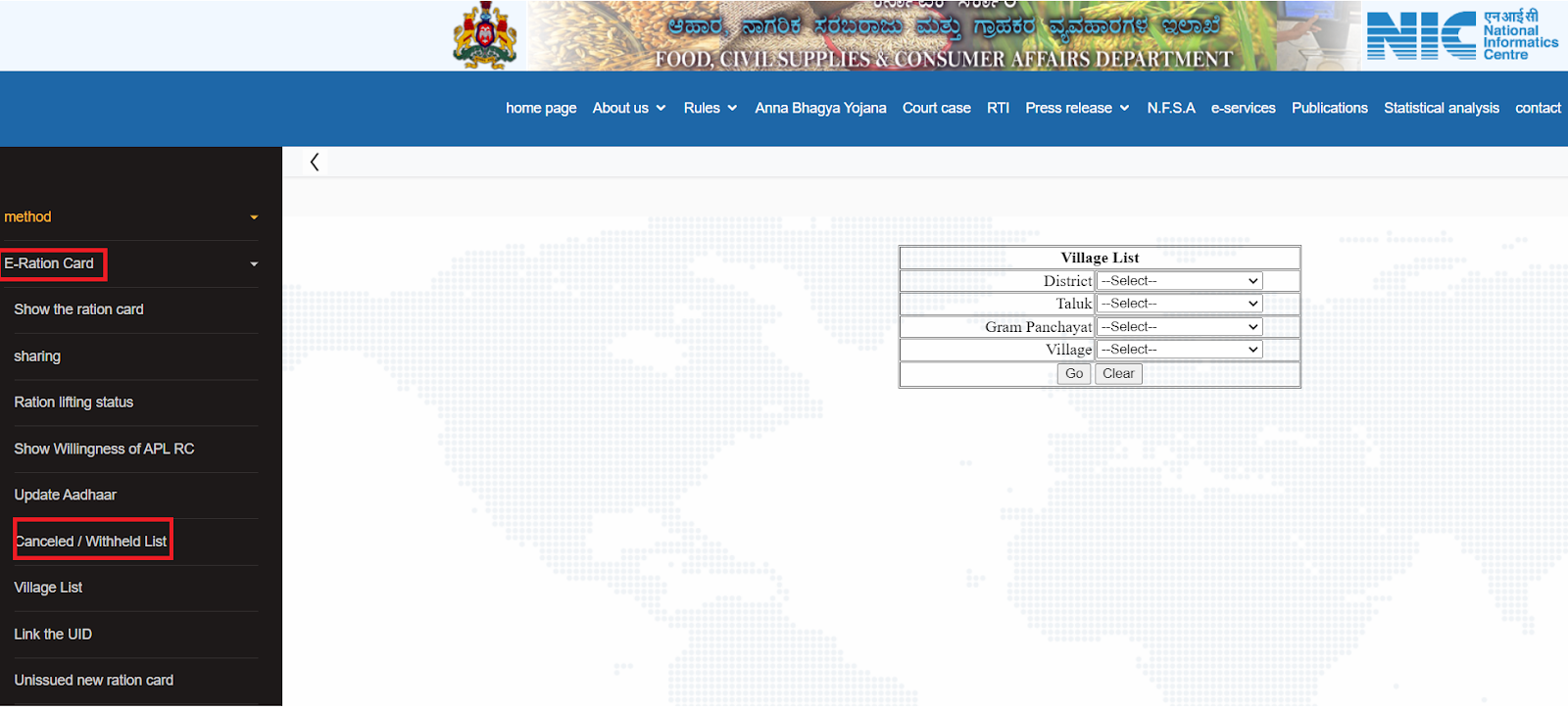
- Provide required details and click ‘Go’ to view the list.
Request Amendments to Existing Ration Card
To request amendments:
- Access Ahara Karnataka - https://ahara.karnataka.gov.in/.
- Click on ‘e-Services’.
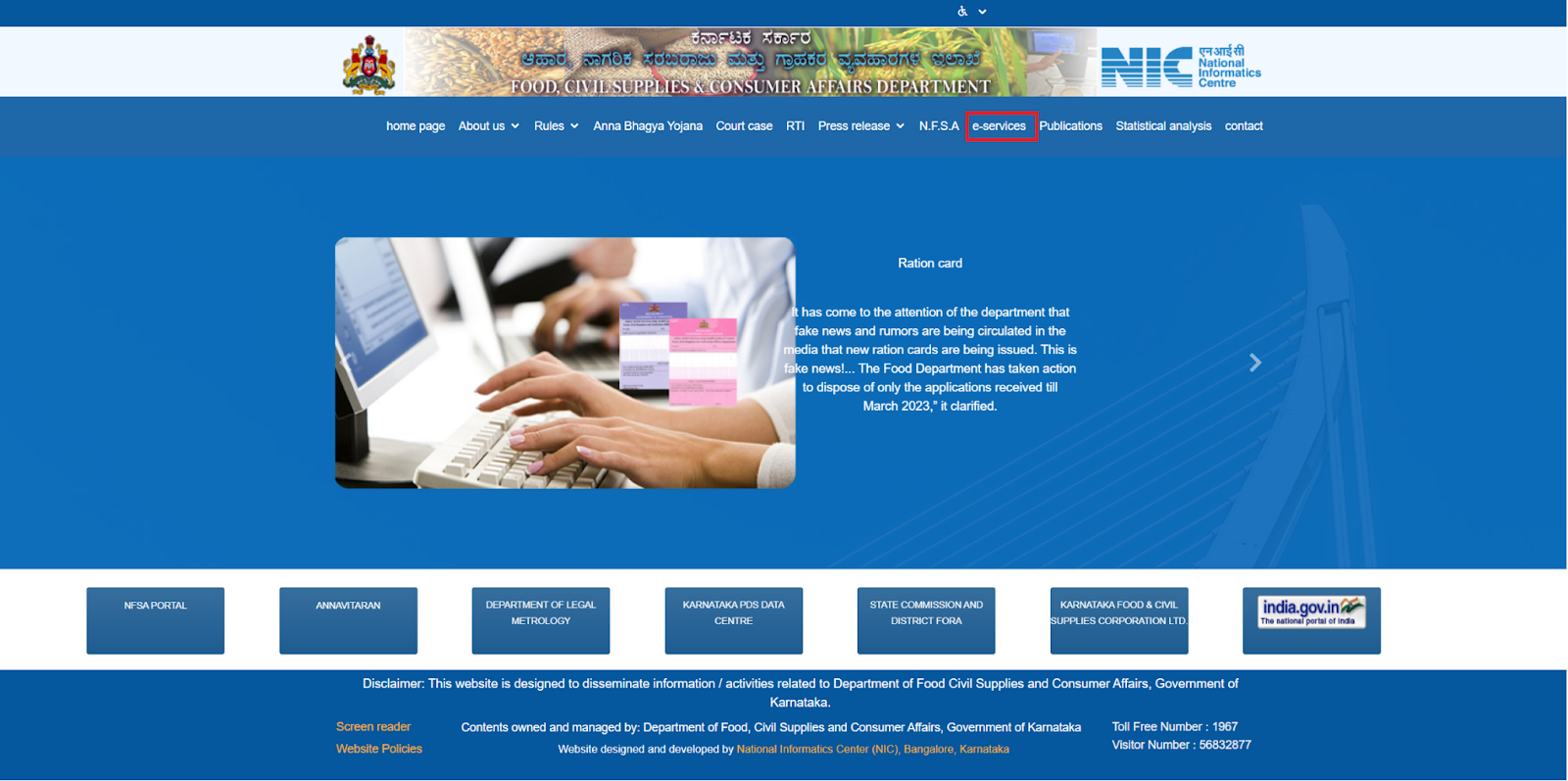
- Choose this option under ‘e-Ration Card’.
- Input your ration card number and provide the details for the amendment request.
- Click ‘Submit’ after filling out the necessary details.
Annabhagya Scheme
The Annabhagya Scheme, launched in July 2013 by the Government of Karnataka, aims to provide affordable and nutritious food to Below Poverty Line (BPL) families under the Public Distribution System (PDS).
Initially, ration distribution was limited to 4 kg of rice and 1 kg of wheat (minimum) per family. From July 2015, the scheme was enhanced to distribute 10 kg, 20 kg, or 30 kg of food grains for single-member, two-member, and three-or-more-member families, respectively, at ₹1/kg. Families with seven or more members receive an additional 5 kg per member.
Other items distributed include fortified palm oil, double-fortified salt, and pulses like lentils and thogaribele, often at concessional rates. Computerization of ration card data, linking Aadhaar numbers, and introducing POS machines have ensured transparency and efficiency.
The scheme has had a significant impact by increasing food security, reducing hunger, and supporting local farmers through market demand for coarse grains like ragi and jowar.
The scheme is complemented by the Ration Guarantee Scheme, ensuring timely and transparent distribution through fair price shops. It also includes the Annabhagya Adalat, held monthly to address grievances related to ration cards and distribution issues.
Annabhagya Scheme: Detailed Table
| Category | Details |
|---|---|
| Launch Date | July 2013 |
| Target Beneficiaries | BPL families under the PDS system |
| Ration Distribution | - Single-member families: 10 kg - Two-member families: 20 kg - Families with 3+ members: 30 kg |
| Additional Allocation | - 5 kg of food grains per member for families with 7+ members |
| Price per Kg | ₹1 |
| Other Items Distributed | - 1 liter fortified palm oil at ₹25 - 1 kg iodized salt at ₹2 |
| Fortified Items | - Double-fortified salt (iodine and iron) - Palm oil enriched with vitamins A and D |
| Special Allocations | - Pulses (lentils and thogaribele) distributed during specific months |
| Current Status of Oil and Salt Distribution | Distribution of palm oil and salt was discontinued after 2017-18 as per government orders |
| Computerization | Aadhaar-linked ration cards, online applications, and POS machines in fair price shops |
| Fair Price Shop Timings | Open daily from 8 AM to 12 PM and 4 PM to 8 PM, excluding state holidays and Tuesdays |
| Ration Guarantee Scheme | Ensures timely supply of ration items with strict compliance at fair price shops |
| Complementary Schemes | - Annabhagya Adalat: Monthly grievance redressal meetings - Reward Scheme: ₹400 for identifying ineligible cards |
| Procurement for Distribution | Food grains and pulses purchased through the Food Corporation of India (FCI) and Open Market Sales Scheme (OMSS) |
| Impact on Farmers | Support for local farmers by creating demand for coarse grains like ragi and jowar |
| Grievance Redressal | Toll-free numbers (1967, 1800-425-9339) and online complaint systems |
| Achievements | - Improved food security - Reduced hunger - Enhanced purchasing power for beneficiaries |
Additional Features and Updates
- Kerosene Distribution:
- 3 liters per month for Antyodaya and priority families without LPG connections at ₹35/liter.
- 1 liter for ration cardholders with gas connections in rural areas.
- Discontinued in urban areas of districts like Shivamogga, Bangalore, and Dakshina Kannada.
- Annabhagya Adalat:
- Monthly grievance redressal meetings (7th of each month) at fair price shops.
- Focus on addressing complaints related to:
- Ration card validity
- Distribution quality and quantity
- Operating hours of fair price shops
- Irregularities in ration distribution.
- Reward Scheme:
- ₹400 for identifying ineligible ration cards.
- 5% reward for reporting illegal transportation or black-market sale of ration items.
- Ration Computerization:
- All data linked to Aadhaar for transparency.
- Real-time updates on stock and distribution.
- SMS alerts about ration availability.
- Special Items and Rates:
- From April 2017, 7 kg of food grains are distributed per member in Priority Households (PHH), including an additional 2 kg purchased under OMSS auctions.
- Lentils and thogaribele provided during specific months at concessional rates.
Impact of the Scheme
- Enhanced food security for over 80% of Karnataka's population.
- Reduced financial burden on BPL families, allowing them to allocate resources for other necessities.
- Supported local farmers through government procurement of coarse grains like ragi and jowar.
- Created a hunger-free state by ensuring nutritional support to the most vulnerable.